CBD Isolate Benefits & Pure Extraction Guide
Delving into the world of CBD, one might encounter various forms, but none as pure as CBD isolate. This form stands out due to its meticulous CBD extraction guide, where every component barring the coveted cannabidiol is meticulously removed. It's the pinnacle of pure CBD extraction, providing a product that is unaccompanied by THC, the notorious psychoactive compound, ensuring users are free from the high associated with cannabis and clear from related drug tests.
While CBD isolate does not incite the entourage effect seen with full-spectrum alternatives, it houses many comparable CBD isolate benefits. Whether looking to quell inflammation or manage anxiety, CBD isolate provides a versatile and potent option. Let's explore the intricate journey of CBD isolate from plant to powder and its myriad of health potentials through this comprehensive CBD isolate guide.
Key Takeaways
- CBD isolate is an exceptionally pure form of cannabidiol, ideal for those requiring THC-free products.
- Understanding the extraction process is key to appreciating the purity and safety of CBD isolate.
- CBD isolate interacts with the endocannabinoid system in ways similar to broader spectrum CBD products.
- Research indicates that CBD isolate may offer significant health benefits, including anti-inflammatory and anxiety-reducing effects.
- Seeking professional advice on the appropriate dosage is vital to optimising CBD isolate use effectively and safely.
Understanding CBD Isolate and Its Unique Advantages
The quest for pure and effective cannabidiol (CBD) has led to the creation of organic CBD isolate, boasting impressive CBD purity that caters to a wide range of health preferences and requirements. As interest in the potential therapeutic applications of CBD grows, it is pivotal to grasp the singular characteristics and advantages of CBD isolate and how it stands apart from other forms of CBD.
Definition and Purity of CBD Isolate
At its core, organic CBD isolate is the zenith of CBD concentration, offering upwards of 99% purity. This isolation process meticulously removes other plant compounds, ensuring a THC-free product. For those seeking the CBD benefits without exposure to THC, CBD isolate provides a preferable solution, assuring no psychoactive effects or concerns over THC in drug testing scenarios. Its impeccable purity makes it an unrivaled choice in the CBD market.
Comparison with Full-Spectrum and Broad-Spectrum CBD
Contrasting the THC-free purity of CBD isolate, full-spectrum CBD preparations embrace a broader array of hemp-derived compounds, including a legally allowable percentage of THC. This full-spectrum blend is thought to induce the ‘entourage effect', wherein the combined influence of cannabinoids is believed to enhance efficacy. Broad-spectrum CBD also contains a variety of cannabinoids but is meticulously formulated to exclude THC. However, ongoing research into the extent of the entourage effect suggests that for individuals requiring or desiring a product without THC, CBD isolate stands out as a potent alternative.
| CBD Type | THC Content | Cannabinoids Present | Ideal For |
|---|---|---|---|
| CBD Isolate | 0% (THC-Free) | Only CBD | Those requiring pure CBD without THC |
| Full-Spectrum CBD | Less than 0.3% | Various including THC | Individuals looking for the entourage effect |
| Broad-Spectrum CBD | 0% (THC-Free) | Various excluding THC | Those wanting a spectrum of cannabinoids without THC |
The Comprehensive Extraction Process of CBD Isolate
Delving into the world of cannabinoids reveals the intricate and precise nature of CBD extraction methods. Among them, the production of CBD isolate stands as a testament to the advanced technological processes aimed at achieving utmost purity. This section outlines the detailed steps and methodologies that transform the raw hemp plant into the highly sought-after crystalline CBD form. Through this process, consumers can trust the reliability and consistency of CBD products designed for therapeutic use.
Utilizing Solvents for Pure Cannabidiol Extraction
The quest for extracting pure CBD begins with the selection of a suitable solvent. The solvents most commonly employed include carbon dioxide (CO2) and ethanol, these being at the heart of the extraction. CO2, due to its unique properties as a supercritical fluid — a state where it exhibits both liquid and gas properties — can penetrate the plant material deeply, dissolving the desired compounds with precision. Ethanol, alternatively, is noted for its efficacy in stripping away a wide spectrum of plant components, ensuring a comprehensive removal. This pure extraction of CBD not only isolates the compound but also maintains the integrity of its molecular structure, setting the stage for a product free of psychoactive elements and unwanted residues.
The Transition from Plant to Crystalline Form
The meticulous process culminates in the evolution of CBD from a component within the raw hemp plant to a refined, crystalline state. After the initial extraction, the concentrated CBD undergoes further purification, where any remaining plant matter, including fats, waxes, and other cannabinoids, are removed. What emerges from this painstaking process is a crystalline CBD form, often presented as a dazzling, pure white powder. This product is not only emblematic of the highest purity but also versatile for incorporation into an array of CBD products, catering to the diverse needs and preferences of consumers seeking the singular benefits of cannabidiol.
How CBD Isolate Interacts with the Endocannabinoid System
The interaction between CBD isolate and the body's endocannabinoid system (ECS) is a remarkable journey of physiological regulation and potential therapeutic effects. As the spotlight intensifies on the non-psychoactive benefits of CBD, particularly CBD isolate—a pure form of the compound—it becomes essential to understand the underlying mechanisms that govern its influence on bodily processes.
Central to this interaction are the CB1 and CB2 receptors, scattered throughout the body, and responsive to cannabinoids like CBD. These pivotal receptors play a role not only in the physiological effects that ensue after the consumption of CBD but in the stability of the body's internal environment as well.
The Role of CB1 and CB2 Receptors in CBD Efficacy
CB1 and CB2 receptors are the cornerstones of the ECS's ability to mediate and maintain human health. CBD isolate's affinity for these receptors, albeit indirect, is thought to alter the release of neurotransmitters in the brain. This modulation is fundamental to the potential beneficial outcomes of CBD, as it may regulate mood, pain perception, and the immune system without invoking the psychoactive effects that are characteristic of THC interactions with these receptors.
Impacts on Physiological Processes
The physiological implications of CBD isolate's engagement with the ECS are vast. Studies suggest that even without the entourage effect afforded by full-spectrum CBD products, CBD isolate may still influence crucial physiological processes. Such influence encompasses:
- Regulation of appetite and digestive functions
- Modulation of pain and sensation, offering potential analgesic effects
- Immune system responses, which include anti-inflammatory properties
Such regulation is pivotal for maintaining homeostasis across various body systems, underlying the burgeoning interest in CBD isolate as a focused therapeutic agent. Indeed, the isolation of CBD and its specific interaction with the ECS reflect CBD's promise in physiological regulation with CBD, providing a beacon of hope for those seeking alternative or adjunct therapies.
With continued research, the nuanced dynamics of CBD endocannabinoid system interaction may reveal further capabilities and uses for CBD isolate, shedding light on a path towards enhanced well-being through cannabinoid-based interventions.
CBD Isolate’s Potential Health Benefits Explored
As we further explore the offerings of CBD, it is imperative to scrutinize the potential health benefits attributed to CBD isolate. This refined substance proposes a range of advantages for individuals seeking wellness through natural means.
Analgesic and Anti-inflammatory Properties
The CBD isolate analgesic properties are gaining attention in the health community for their potential to alleviate various forms of discomfort. CBD Isolate, known for its anti-inflammatory capabilities, may offer a soothing reprieve for those with chronic pain, inflammation-induced disorders, or temporary ailments. The relief provided could span from a reduction in nausea to easing of muscle tension, presenting promising applications for people with these health issues.
Anxiety and PTSD Management with CBD Isolate
Among the array of CBD benefits, its role in mental health management, particularly in providing CBD anxiety relief, is noteworthy. Preliminary research indicates that CBD isolate has a calming effect on the body's response to stress, potentially decreasing autonomic arousal – the nervous system's reaction to stress – which can manifest as heart palpitations or an increased heart rate. Its impact on conditioned fear responses also hints at the therapeutic potential of CBD isolate in the treatment of anxiety disorders and PTSD, offering a beacon of hope for affected individuals seeking non-pharmacological interventions.
While studies continue to uncover the varied spectrum of health benefits offered by CBD isolate, from pain and inflammation to stress and anxiety management, individuals considering its use should proceed with informed caution. The promising qualities of CBD as an analgesic, anti-inflammatory, and anxiolytic agent underscore the importance of this substance in the evolving dialogue on integrative and holistic approaches to health.
Assessing the Safety Profile of CBD Isolate
When investigating the therapeutic benefits of CBD isolate, one of the fundamental aspects to consider is its safety profile. While CBD isolate is widely recognized for its potential health benefits, understanding the nuances of its side effects, drug interactions, and appropriate dosage is crucial.
Side Effects and Drug Interaction Concerns
Although CBD isolate is considered generally safe, users have occasionally reported side effects, which may include changes in appetite, diarrhea, fatigue, and weight fluctuations. Notably, CBD isolate side effects can vary from person to person and are often dose-dependent. Given these variables, individuals must observe their body's responses when consuming CBD products.
Moreover, awareness around drug interactions with CBD is of utmost importance. Similar to other substances that carry grapefruit warnings, CBD isolate has the potential to interact with specific medications, altering their effectiveness or side effects. The compounds in CBD isolate can affect the metabolism of drugs in the liver, particularly those belonging to the cytochrome P450 enzyme group. Therefore, prior to starting any CBD regimen, a thorough discussion with a healthcare provider is advisable.
For individuals also consuming substances like alcohol, considerations regarding CBD safety must be even more stringent, as combinatory use can accentuate the sedative effects typically associated with alcohol.
Understanding Dosage and Administration
Finding the right CBD dosage recommendations tailored to an individual's unique needs is an essential factor in maximizing CBD isolate's therapeutic potential while minimizing risks. Dosage can be influenced by various factors, including body weight, the condition being treated, and individual body chemistry.
To establish a starting point for CBD isolate consumption, it is often suggested that users begin with a low dosage and gradually increase it while monitoring the effects. This approach encourages responsible usage and helps pinpoint an effective dose that offers the desired health benefits without adverse effects. However, for personalized and professional guidance, consulting with a healthcare provider is paramount.
A critical element of the discussion around dosage is the understanding that CBD isolate products come in myriad forms, from tinctures to edibles, each with different concentrations of CBD. As such, dosage recommendations may vary accordingly and should be navigated with careful consideration and expert advice.
How to Choose the Right CBD Isolate Product
With the surge in CBD products on the market, finding the optimal CBD isolate for individual needs may seem formidable. However, with a strategic approach involving expert guidance and an understanding of personal health goals, you can navigate the myriad options with confidence. Summarizing the benefits of CBD isolate is only the beginning; the next crucial step is making an educated decision on which product to incorporate into your daily regimen.
The Importance of Expert Consultation
Choosing the right CBD isolate goes beyond simply selecting a high-quality product. Engaging with healthcare professionals or consulting a cannabis clinician can significantly enhance the decision-making process. These experts can assist in reviewing your health history, goals, and any current medications to recommend a CBD isolate product that aligns seamlessly with your lifestyle and provides the most substantial benefits.
Matching CBD Products with Individual Needs
Finding a CBD product that fits one's individual health requirements calls for an understanding of different formulations and their concentrations. From tinctures to capsules, the CBD content can vary, affecting the efficacy and delivery of desired results. Under the guidance of healthcare providers, users can identify the most appropriate form and dosage of CBD isolate, ensuring they select a product tailored to their specific well-being objectives.
| CBD Isolate Form | Potential Use | Benefits | Considerations |
|---|---|---|---|
| Powder | Versatile use in food and beverages | Easy to measure and dose | Taste may require masking in some foods |
| Capsules | Convenience for on-the-go usage | Precise dosing without preparation | Limited flexibility in adjusting dose |
| Tinctures | Sublingual application for fast absorption | Allows for incremental dosing adjustments | Requires understanding of dropper measurements |
Your journey with CBD isolate begins with choosing the right product and dosage that works in harmony with your body's needs. When selecting a CBD isolate, consider its purity, source, and the reputation of the manufacturer. Always look for third-party lab test results to ensure you receive the highest quality product free from contaminants and precise in CBD content. This diligence, combined with expert advice, can pave the way for a rewarding and safe experience with CBD isolate.
Distinguishing CBD Isolate from Other CBD Formats
In the diverse landscape of CBD products, CBD isolate emerges as a standout format due to its unique properties and composition. Understanding these distinctive aspects can help consumers make more informed choices, especially those with legal and drug testing considerations.
Physical Characteristics of CBD Isolate
The defining CBD isolate characteristics hinge on its existence as a crystalline powder, marked by its purity and lack of distinct odor or flavor. This sensory neutrality positions CBD isolate uniquely amongst other CBD formats such as full-spectrum and broad-spectrum products, which retain varying elements of the cannabis plant's scent and essence. Moreover, this THC-free isolate boasts a versatility that proves advantageous for both formulating other products and use in direct consumption.
Legal Considerations and Drug Testing
When it comes to navigating the complex legalities of CBD products, legal CBD often pertains to products like CBD isolate, labeled as THC-free. Such products are burgeoning in popularity among consumers who need to comply with legal restrictions or workplace regulations concerning drug use. Nonetheless, it's imperative to recognize that even products branded as free from THC might contain trace amounts, which, though typically insignificant, could potentially surface on sensitive CBD drug tests. Hence, meticulous attention to product sourcing and labeling remains essential for those who must adhere to stringent THC constraints.
- Legal status relies on the absence of THC, not merely its reduction.
- CBD isolate is often sought for its non-psychoactive and THC-free promise.
- Trace amounts of THC in CBD formulations can impact drug testing outcomes.
For consumers who prioritize THC-free options, CBD isolate is an attractive choice, but due diligence is recommended to ensure compliance with all legal and personal requirements.
The Versatility of CBD Isolate in Consumption
CBD isolate's unrivaled purity not only delivers an experience devoid of THC but also introduces a world of versatility when it comes to consumption. It's the perfect choice for those looking for diverse ways to incorporate CBD into their lifestyle without altering natural flavors of their favorite foods or beverages.
Various Methods of Ingesting CBD Isolate
Ingesting CBD isolate can be a tailor-fit experience, adapted to personal preferences and lifestyle. This non-intoxicating compound can be used in a number of ways:
- Mixing with food items for a culinary approach to wellness.
- Dissolving in beverages for a seamless addition to hydration habits.
- Administering sublingually under the tongue for fast absorption.
- Incorporating into capsules for controlled and convenient consumption.
The flavorless facet of CBD isolate makes it a subtle addition to any meal or drink, allowing for a seamless integration into daily routines.
Creating Custom CBD Infusions with Isolate
For those who value creativity and control over their CBD intake, CBD isolate opens the door to crafting custom CBD infusions. Whether you're a wellness enthusiast or a culinary connoisseur, the adaptability of CBD isolate empowers you to create versatile CBD formulations tailored to your needs:
- Creating personalized CBD-enriched skincare products for topical application.
- Designing custom-made CBD tinctures with specific carrier oils.
- Infusing CBD into baked goods for a wellness-oriented treat.
- Formulating homemade CBD capsules with exact dosages.
CBD isolate's ease of use in various DIY projects makes it appealing for those seeking a hands-on approach to their health and wellness regime.
Full-Spectrum vs. CBD Isolate: Efficacy Comparisons
The ongoing debate in the realm of cannabinoids scrutinizes the efficacy between full-spectrum CBD, known for its entourage effect, and CBD isolate, renowned for its unmatched purity. It is fundamental to evaluate how these distinct types interact with the body's systems and how the presence or absence of other hemp-derived compounds, including THC, play a role in their effectiveness.
Analyzing the Entourage Effect
The concept of the entourage effect hinges on the synergistic interaction of cannabidiol (CBD), THC, and other minor cannabinoids present in full-spectrum CBD. This phenomenon suggests that the therapeutic impact of the whole plant is greater than that of any single compound used alone, potentially enhancing the overall efficacy of full-spectrum CBD products. Deciphering the nuances of these interactions is critical for those seeking holistic benefits attributed to this combined approach.
In contrast, CBD isolate offers a straightforward, singular approach to cannabinoid therapy. Without the company of THC and other cannabinoids, CBD isolate efficacy comes into question, especially for those drawn to the purported enhanced benefits seen in the full-spectrum alternative.
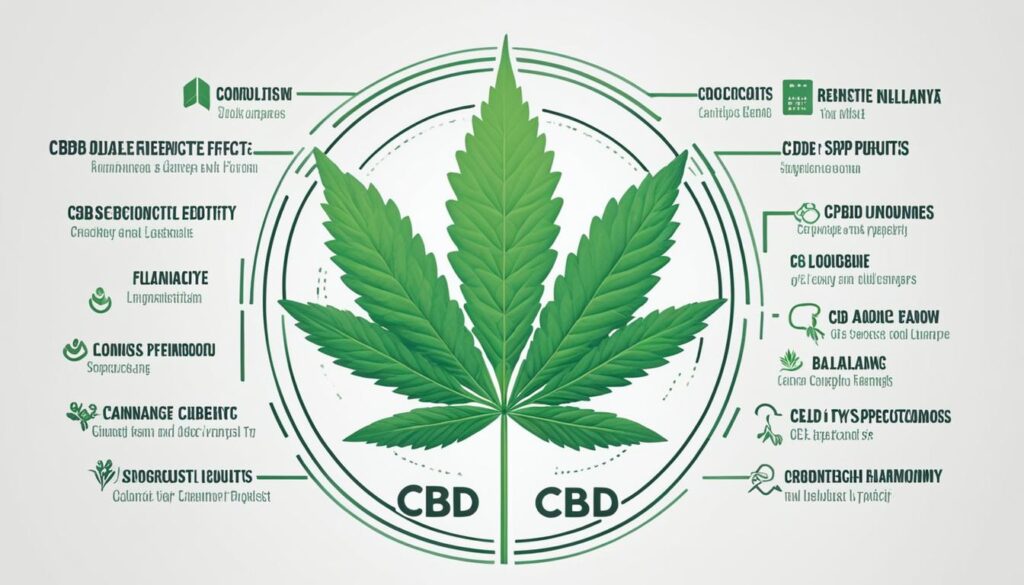
Potential Limitations of CBD Isolate
While CBD isolate delivers a high degree of purity, it is essential to acknowledge its potential limitations clinched by its solo performance. Lacking the varied cannabinoid profile, CBD isolate may not tap into the full symphony of therapeutic potentials allegedly accessible through the entourage effect. However, for individuals seeking a pure, THC-free experience—regardless of the THC effects on CBD—CBD isolate stands out as a formidable option, promising the benefits of CBD without the complexity of additional cannabinoids.
Ultimately, personal health goals and requirements govern the preferred choice. A well-informed decision, weighing the absence of THC in the efficacy of CBD isolate against the potential compounded benefits full-spectrum CBD may provide through the entourage effect, is essential for optimizing the therapeutic experience.
Targeted Applications of CBD Isolate
The emergence of CBD isolate for anxiety and mood disorders, as well as its role in addressing pain and inflammation, are significant advancements in the realm of CBD applications. This purified form of CBD, free from the psychoactive effects of THC, offers a tailored approach to managing various health concerns. Let's delve into the specific applications that highlight CBD isolate's therapeutic promise.
Managing Anxiety and Mood Disorders
The potential of CBD isolate for anxiety is substantial, with research suggesting that its use may result in a measurable decrease in anxiety levels. Anecdotal evidence and preliminary studies point to the ability of CBD isolate to improve sleep and overall mood, providing an alternative option for those seeking mood disorder management without the side effects commonly associated with traditional pharmaceuticals.
Addressing Pain and Inflammation
Equally impressive is CBD isolate's capacity to act as an anti-inflammatory CBD agent. Its properties may be invaluable for individuals suffering from conditions characterized by pain and inflammation, such as arthritis or neuropathic pain. While CBD isolate is effective on its own, it's important to acknowledge that some studies suggest an enhanced analgesic effect when combined with THC, as in full-spectrum CBD products.
| Condition | Potential Benefit of CBD Isolate | Additional Notes |
|---|---|---|
| Anxiety Disorders | May reduce anxious feelings and improve calmness | Effects can vary among individuals; further research is ongoing |
| Mood Disorders | Potential to improve mood and sleep quality | Could serve as an adjunct or alternative to conventional treatments |
| Chronic Pain | May provide relief from chronic pain symptoms | Anti-inflammatory effects can assist with various pain conditions |
| Inflammatory Conditions | Can aid in reducing inflammation and associated discomfort | Suggests potential for a natural approach to inflammation management |
Epilepsy and the Role of CBD Isolate in Treatment
The discussion of CBD isolate has become particularly significant in the context of epilepsy, a neurological disorder characterized by frequent seizures. Over recent years, the potential of CBD as an effective treatment for seizure disorders has generated substantial interest within the medical community, particularly due to the emergence of antiseizure CBD medications.
Antiseizure Effects and FDA-Approved Uses
At the forefront of this medical breakthrough is Epidiolex, an FDA-approved CBD medication specifically designed to treat certain forms of epilepsy. This prescription drug, which contains CBD isolate, has undergone rigorous clinical trials and has been proven to significantly reduce the frequency of seizures in individuals with conditions such as Dravet Syndrome and Lennox-Gastaut Syndrome. The emergence and approval of Epidiolex have validated the therapeutic role of CBD in epilepsy treatment, opening new avenues for managing this challenging condition.
Medical Community Stance on CBD Isolate for Epilepsy
The medical stance on CBD for epilepsy is evolving, with ongoing research and clinical experience informing opinions. Although there is growing acceptance of CBD's use in treating seizure disorders, professionals emphasize the importance of considering CBD as an adjunct to established epilepsy treatments rather than a standalone remedy. Moreover, medical experts recommend that patients and caregivers engage in open dialogue with healthcare providers to determine whether CBD isolate could be incorporated into their treatment plans, tailored to individual needs and with careful monitoring of dosages and responses.
CBD Isolate in Oncology: Current Research Insights
The intersection of CBD utilization in oncological practices is reflected in the budding interest and investigatory efforts looking at CBD in oncology. This aspect of cancer treatment with CBD is evolving, with scientists exploring its potential in both direct anticancer applications and as an adjunct in the alleviation of treatment side effects.
Potential Anticancer Properties
Recent explorative studies have hinted at the anticancer properties of CBD. Initial laboratory and animal research show that CBD isolate might inhibit the proliferation and induce apoptosis in certain cancer cell lines. While these insights establish a promising foundation, comprehensive human clinical trials are needed to ascertain the efficacy and safety of CBD as part of cancer therapy. It remains essential to recognize that the National Cancer Institute, while acknowledging the potential, does not officially endorse CBD as a cancer treatment pending more substantive evidence.
Alleviating Cancer Treatment Side Effects
Separate from its anticancer potential, CBD isolate is also under investigation for its capability to offer side effects relief commonly associated with cancer treatments, such as chemotherapy. Patients often confront symptoms like nausea, vomiting, and pain, which can significantly affect their quality of life. Anecdotal reports and preliminary studies suggest that CBD may help mitigate these discomforts and support overall well-being during the strenuous journey of cancer treatment.
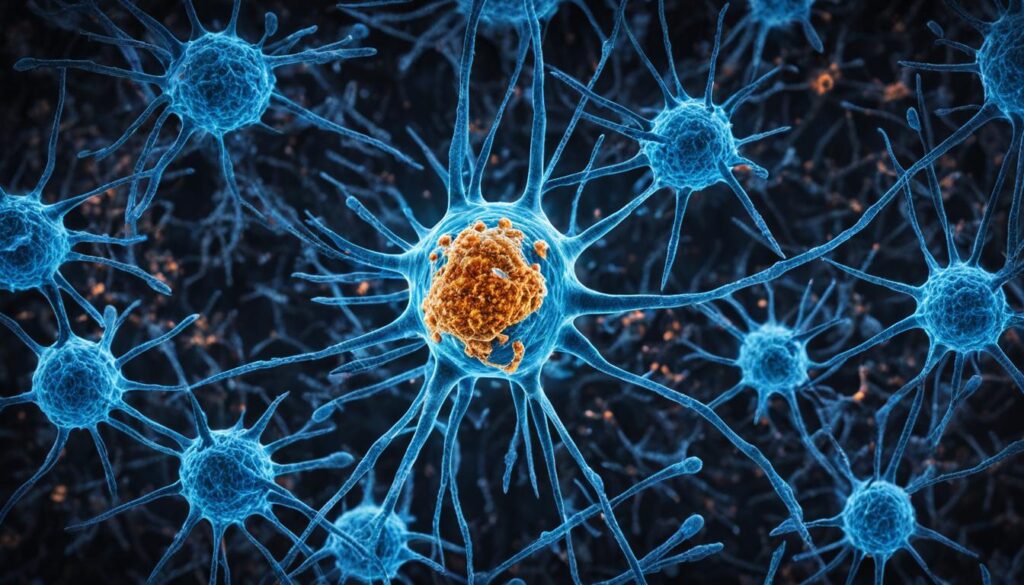
As research continues to delve into the therapeutic landscapes of CBD, it is crucial for patients and healthcare providers to dialogue about current findings and consider the integration of CBD into treatment protocols with an evidence-based approach. Ongoing clinical trials and further investigation will hopefully elucidate the role CBD can play in oncology, both in terms of its anticancer properties and its efficacy in improving the quality of life for those undergoing cancer treatments.
Precautions and Potential Risks of CBD Isolate Use
While CBD isolate is celebrated for its purity and potential therapeutic benefits, there's a need for caution and awareness regarding its use. As with any health supplement, individuals must consider CBD precautions and be informed about CBD contraindications and CBD isolate risks to safeguard their well-being. It's especially important to have an understanding of the potential for liver toxicity and CBD use, and to consult healthcare professionals when incorporating CBD into a wellness routine. Let's delve into the critical considerations and how to responsibly navigate CBD isolate usage.
Identifying Contraindications and Cautions
It's essential for users to be aware of certain health conditions or medications that may interact negatively with CBD. CBD isolate, like many substances, can affect the metabolism of other drugs, a concern particularly relevant for medications with a grapefruit warning. Additionally, individuals should be mindful of their personal health conditions and seek medical advice to determine if CBD use is suitable, thus ensuring they do not encounter unintended CBD isolate risks.
Mitigating the Risk of Liver Toxicity
Research has indicated that high dosages of CBD may lead to liver toxicity. This risk underscores the importance of not exceeding recommended dose levels and of engaging in regular monitoring if consuming higher quantities of CBD, whether for therapeutic or personal reasons. A proactive step in mitigating these risks involves consulting with a healthcare provider to tailor a safe and effective CBD regimen.
| Risk Factors | Precautions | Recommendations |
|---|---|---|
| Drug Interactions | Consult with a healthcare provider | Avoid use if on medications affected by grapefruit |
| Dosage Levels | Start with a low dosage and observe effects | Do not exceed the dose recommended by a professional |
| Liver Health | Monitor liver enzyme levels if at risk or using high CBD doses | Seek immediate medical attention for signs of liver distress |
In conclusion, while the potential of CBD isolate for therapeutic use is compelling, it is accompanied by the responsibility of users and healthcare professionals to remain diligent about CBD precautions. By acknowledging CBD contraindications, adhering to informed dosage guidelines, and watching for signs of liver toxicity and CBD interactions, we can foster a safer environment for the exploration and enjoyment of CBD's benefits.
Conclusion
In our comprehensive exploration of CBD isolate, we've delved into its extraction process, interaction with the endocannabinoid system, and its broad CBD therapeutic profile. CBD isolate stands out for its potency and purity, offering a promising therapeutic agent for various health conditions including anxiety, pain, and inflammation. As with any substance that influences physiological functions, an informed CBD use is essential for harnessing CBD isolate's effectiveness while ensuring safety.
Recap of CBD Isolate’s Therapeutic Profile
The therapeutic prowess of CBD isolate encompasses a significant range of potential health benefits. Research highlights its analgesic and anti-inflammatory effects, which may offer relief from chronic pain and inflammation. Furthermore, CBD's interaction with the endocannabinoid system has shown promising results in reducing anxiety and aiding in the management of stress-related disorders. Importantly, it has garnered attention for its antiseizure properties, contributing to treatments for epilepsy, and ongoing research investigates its use within oncology.
Moving Forward with CBD Isolate: An Informed Approach
To maximize CBD isolate effectiveness, consumers are encouraged to take an informed approach. Consulting with healthcare professionals can provide insight into personal health needs and appropriate dosage levels. Quality is also of paramount importance; selecting products from reputable sources ensures purity and potency. By making educated decisions about the integration of CBD isolate into one's health regimen, individuals can approach its use responsibly, laying the groundwork for a positive and beneficial CBD experience.
FAQ
What is CBD isolate and how pure is it?
CBD isolate is a form of cannabidiol, one of the many compounds found in the hemp plant. It is characterized by its high purity, typically upwards of 99%, and contains only CBD without any other cannabinoids, terpenes, or flavonoids. This makes it a THC-free option.
How does CBD isolate differ from full-spectrum and broad-spectrum CBD?
Unlike full-spectrum CBD which includes a variety of cannabinoids that create an entourage effect, CBD isolate is purely cannabidiol without other hemp compounds. Broad-spectrum CBD is similar to full-spectrum but also does not contain THC, like CBD isolate.
What methods are used to extract pure CBD to create CBD isolate?
The extraction of pure CBD for CBD isolate involves the use of solvents such as carbon dioxide or ethanol. These substances help to isolate CBD from other plant compounds, resulting in a crystalline substance that can then be processed into a powdered form.
How does CBD isolate interact with the endocannabinoid system?
CBD isolate interacts with the body's endocannabinoid system by influencing CB1 and CB2 receptors. This interaction can help regulate central nervous system functions, immune system responses, and emotional well-being.
What are some potential health benefits of using CBD isolate?
Research suggests that CBD isolate may offer a variety of health benefits, including analgesic and anti-inflammatory effects, reduction in nausea and muscle tension, anxiety relief, and possibly aiding in the management of PTSD symptoms.
Are there any side effects or drug interaction concerns with CBD isolate?
Like many substances, CBD isolate can have side effects such as appetite changes, diarrhea, and fatigue. It can also interact with certain medications, particularly those with a grapefruit warning. It's important to consult a healthcare provider for guidance.
How should one choose the right CBD isolate product?
Selecting the right CBD isolate product involves consulting healthcare providers or cannabis clinicians who can advise based on individual health needs, ensuring the product aligns well with personal health goals.
What distinguishes CBD isolate from other CBD formats in physical characteristics?
CBD isolate is usually found in a crystalline powder form that is both tasteless and odorless, which differs from full-spectrum CBD products that may have the flavor and scent of cannabis plant compounds.
Are there legal concerns or drug testing issues with CBD isolate?
CBD isolate products are labeled as THC-free, which often exempts them from legal restrictions associated with cannabis and typically doesn't show up on drug tests. However, users should be cautious as sensitive drug tests may detect trace amounts.
How can CBD isolate be consumed?
There are various ways to consume CBD isolate, including adding it to food, drinks, or creating topicals. Its flavorless nature allows it to be easily incorporated into different CBD infusions without affecting the taste of the product.
What are the pros and cons of CBD isolate compared to full-spectrum CBD?
While full-spectrum CBD may offer heightened therapeutic benefits due to the entourage effect, CBD isolate is preferable for individuals who want to avoid THC. It's important to consider that the efficacy of CBD isolate might be different than that of full-spectrum CBD due to the absence of other cannabinoids.
What specific applications does CBD isolate have for managing anxiety and mood disorders?
CBD isolate shows potential in helping to decrease anxiety levels and enhance mood stability. It has been used in studies assessing its impact on reducing symptoms of anxiety disorders and improving sleep patterns.
How does CBD isolate help with pain and inflammation?
CBD isolate's anti-inflammatory properties make it a candidate for treating various types of pain, including arthritis, neuropathic pain, and chronic back pain. It may provide an alternative for those seeking anti-inflammatory and analgesic effects.
What is the role of CBD isolate in epilepsy treatment?
CBD isolate has antiseizure effects and is the active ingredient in the FDA-approved drug Epidiolex, which is utilized for the treatment of rare and severe forms of epilepsy. Ongoing research and medical assessments continue to explore its full potential in epilepsy treatment.
How is CBD isolate being researched in oncology?
CBD isolate is under investigation for potential anticancer properties and its ability to help alleviate side effects of cancer treatments like nausea and vomiting. Although promising, substantial research is needed to fully understand its role in cancer care.
What are the precautions and potential risks associated with CBD isolate?
Potential risks include drug interactions and possible liver toxicity at higher doses. It's crucial to identify any contraindications, adhere to recommended dosage levels, and consult with a healthcare provider to mitigate risks.
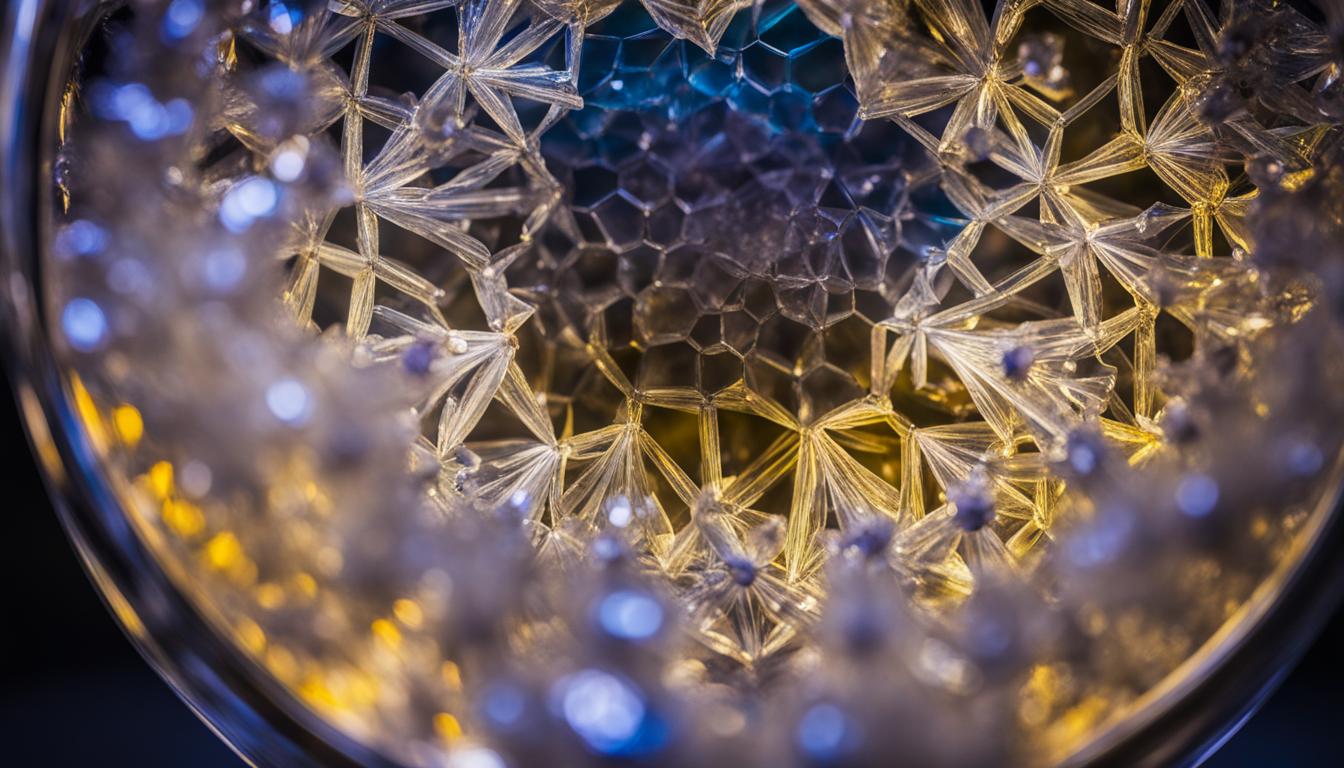
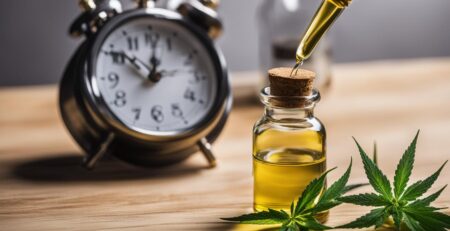


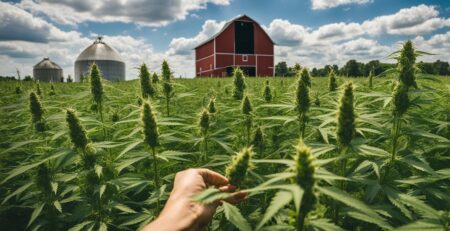
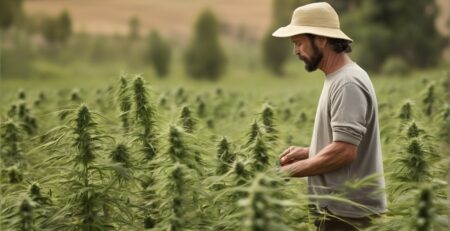





Leave a Reply